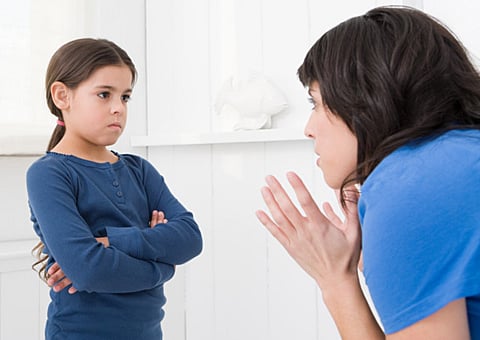When to start using a firm hand
From angels to terrors and back again

Almost every parent has gone through this — a temper tantrum from the toddler at the mall as he ferociously clutches on to a toy at the Early Learning Centre and refuses to give it back when you delicately try to extract it, to the delight (or dismay) of the sales clerk. Or perhaps you’ve experienced a similar scenario to a first-time parent like myself with a boy of ten months who’s determined to pull the long strands of both your hair and his baby mate at the nursery.
Examples such as the above will always abound as new and well-seasoned parents cope with how to deal with their children, and struggle to grasp what discipline really means and how to make it work for their parenting lifestyle.
Nailing discipline
According to the Webster dictionary, the word discipline means to impart knowledge and skill. In effect, then, it means to teach. Effective discipline should accomplish four things. It should teach right from wrong. It should instil a sense of self-confidence. It should teach respect for the rights and feeling of others. And lastly, it should protect your child.
But how does one go about doing this? Various trains of thought exist when it comes to this topic and go by different names, ranging from positive, gentle, boundary-based, behaviour modification to emotional coaching discipline, authoritative, authoritarian, and permissive parenting. Amidst this tangle of terminologies, methodologies and tips, it can leave first-time parents such as my husband and I frantically grasping every child psychology book at Kinokuniya or furiously typing in several keywords online for answers.
According to Dr Kamal Akkach, a specialist in paediatrics at HealthBay Polyclinic and a parent, sticking to one discipline method for your child is simply not effective. “Every child is unique and the one-size cookie cutter method will just frustrate you and your child, which will subsequently lead to acts of goading your child into submission.” He adds that “this is something you just don’t want to do.” Instead, he suggests, spend some time in observing your child, note his reactions to certain situations, and create a model based on his age and development milestones.
Setting things straight early on
Across the board, award-winning books such as the What to Expect series from Heidi Murkoff to popular online parenting forums and even parenting expert, Dr Phil, suggest the keyword to child discipline is consistency. It starts as early as seven to eight months as this is when little babies start crawling and exploring their surroundings. All kinds of mischief come to play, including electrical outlets, cables and cords. The best way to react when the crawler comes over to the TV wiring is to redirect. Pull the object out of their hand and redirect with a toy or something that will distract them.
While babies at this age have not yet developed the faculty for comprehension, they’re much more interested in understanding the cause and effect. Move into the 1½ to 2 years territory, and rampant acts of misbehaviour become common.
Dubai-based Harriett Type, a first-time mum to one-and-a-half-year-old Gabriel claims that it takes a few different techniques to get her little man’s tantrums under control. “I try not to overuse the word no when Gabriel acts out inappropriately as it will quickly lose its meaning,” adding, “instead it’s all about a stern tone of voice, explaining why he can’t behave in such a way, followed by small amounts of isolation (placing him in his room with the door slightly ajar), if necessary.” Harriett does admit that this exercise can be exasperating and emotionally draining.
Susan Holloway, aged 42, from Sharjah and parent to three kids aged four, seven and 13 sums it up nicely. “Discipline is just a way of life, and setting boundaries and keeping to it will no doubt let your children grow into wholesome adults with a set of values and respect for both themselves and others around them,” she says. “And isn’t that what we’re supposed to do?”



